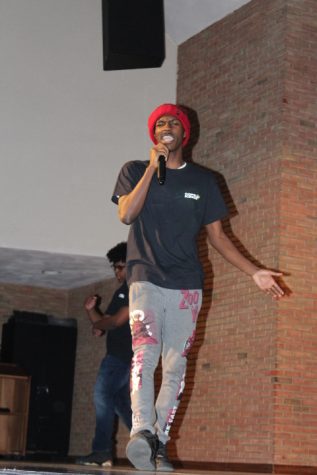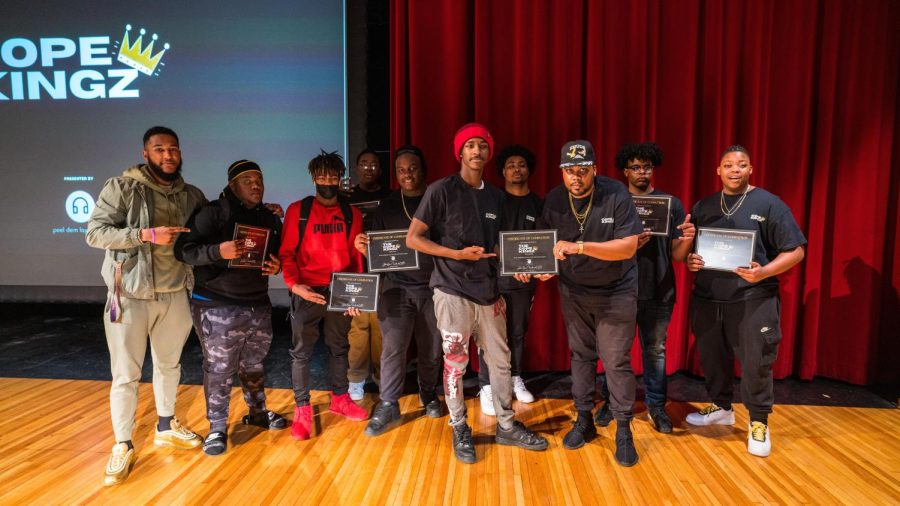Local rapper uses music to empower Black high school students
Left to Right: Ivan Conard, Omarion Royster, Jae’Von Johnson, Tristan Lawler, Isaiah Amos aka Zay, K’Vyayre Hill aka Choppa Smoov, Q aka Quentin Upshaw, Archie Green, Amari Mercury, Tahj Banks aka King Tahjy pose after the Cope Kingz Showcase
April 6, 2022
The Cope Kingz waited anxiously in the wings of the stage as their classmates filled the empty seats. They have been rehearsing for weeks, all coming down to this one performance. Kendrick Lamar’s voice filled the auditorium. Suddenly, the song cut off and the men emerged, ready to show their hard work as their peers cheer them on.
Theodore Roosevelt High School was the first school Archie Green, a rapper from Cleveland, worked with for his program Cope Dealer on March 17. This 10-week program was focused on helping Black high school students, the Cope Kingz, and was created as a reflection of the way Green coped with his own struggles. The goal of Cope Dealer is to “educate, equip and empower Black men with hip hop through mental health,” Green said.
Green graduated from New York University with a master’s degree in music business. He became a mental health advocate in 2016 with the intention of using music to promote mental health initiatives.
His programs focus on offering mental health services through a hip-hop lens. The first program, Peel Dem Layers Back, was created based on his own song bearing the same name. From this Green created other initiatives, such as Cope Dealer, adding a focus on coping with daily stressors.
Throughout the program the Cope Kingz met with a facilitator, social worker Ivan Conard, to learn about mental health through music. Green’s music was dissected and analyzed while the students were shown how music can become an outlet.
Every session started with Conard and the students discussing their lives and the emotions they were experiencing.
Conard witnessed the students’ growth as they met week to week. The first session of the program was interrupted by a lockdown drill which led to a student in the program being taken by police after bringing an unloaded pellet gun to school. When a similar issue arose later, the students had a different reaction, thanks to the skills they had learned through the program.
“When the first incident occurred, they were frozen,” Conard said. “But later when that trauma resurfaced, they now had questions.”
The change in the students’ attitudes toward mental health and similar issues was evident throughout the showcase. It featured songs they had written and recorded with Green as the culmination of the program.
When introducing a song about mental health, one student talked about the prevalence of mental health issues within his age group, acknowledging the fact that he was not alone.

“I took all these emotions and put them into this song,” student K’Vyayre Hill, who goes by Choppa Smoov, said.
Creating art with these emotions is what the program intended to teach. Green’s own music speaks about mental health and the issues he’s faced as a Black man. He created the program to teach young Black men about this outlet.
“It showed me the power of music and the power of hip hop,” Green said. “And how to use something that is familiar, while interjecting something that’s not as normal. To normalize the behavior of talking about what’s going on with someone mentally, without feeling embarrassed.”
While there are many different coping mechanisms, music can be used to say things words are unable to reach.
“I can talk to someone but when you hear a song you’re sharing [that emotion],” Conard said. “Music is expressing. It’s not just talking or feeling the emotion.”
Along with music, the students were taught other coping mechanisms, such as personal mantras, throughout the program to battle mental health issues. These mantras were created by the students and included messages such as, “I will change the perspective of Black men in America.”
Watching the group evolve over the course of the program was the most rewarding element, Green said.
“I’m grateful that these young men have healed as they’ve gone through this process,” Green said. “And I’m hopeful that they’ll continue the bond that they’ve created.
Mental health in teens and young adults has been a topic of conversation after the pandemic worsened mental health effects. Mental health issues have also been a prevalent issue in Black men. A reported seven million Black Americans reported they had a mental illness within the last year. When studied, Black men were some of those particularly concerned about the stigma revolving around mental health.
“Cohort effects, exposure to mental illness, and increased knowledge of mental illness are factors that could potentially change beliefs about symptoms of mental illness,” the study stated.
Green used this concept in his programs and focused on creating a community throughout their duration.
Green plans to keep in touch with the group as they take these skills into the rest of their lives. He is hopeful for the future as he looks to expand the program into other Northeast Ohio schools and eventually the rest of the country.
Green’s assistant, Shelly Gates, watched the program grow and expand. “I’m super excited for what we have coming up, working with possibly some schools in Columbus,” Gates said. “Our PR person is based in LA so just expanding the program and creating more classes with Cope Dealers that can push these coping mechanisms into their community [is exciting]. It’ll be a whole huge thing versus a small group of people.”
Until then, Green and his team are proud of the work the Cope Kingz have done and are hopeful for the future.
“Some of them want to do music, some want to run their own business and some want to work with their families,” Green said.” But the most important thing is that they can carry this experience with them for life, period.”
Madeleine Majikas is a reporter. Contact her at [email protected].

























